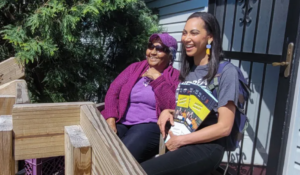Growing up alongside a brother with disabilities inspired me to fight for education equity

When my big brother was in first grade, my mom received devastating news from his teachers: that Alex, the best person I know, may never learn how to read.
It was the worst news my parents had gotten since doctors first told them three years earlier that Alex had intellectual disabilities, and he would never develop or learn at the same pace as his peers. “I just wanted him to be successful,” my mom recalled recently. “How could Alex ever be successful if he couldn’t read? He just couldn’t.”
For me, Alex and my family are the reasons I was inspired to join Chalkbeat Tennessee. I want to dedicate my career to reporting on educational equity and the teachers, administrators, and families who face outsized odds but refuse to give up as they teach children with a myriad of challenges.
My mom didn’t give up. She worked tirelessly alongside his teachers to ensure he did learn to read. Playing on one of Alex’s biggest strengths — an almost annoying near-photographic memory — she suggested using flashcards and other memorization techniques to get him started with reading. Day and night, at school and at home, Alex’s teachers and our parents spent countless hours working with him.
When teachers noticed he could read but that he wasn’t comprehending the content, she told them to stop timing him. Alex, being the competitive kid he was, was speeding just to cross the finish line in time.
Thankfully, Alex’s teachers were wrong about him. My brother, now 27, loves to read magazines and anything Disney-related. He even dreams up his own ideas for movies or television shows on pen and paper.
Alex is just one example of countless other people with disabilities whose intellectual potential was underestimated. Like Alex, they often succeed because of their family’s efforts to ensure their child’s academic, social, and emotional needs are met in the classroom.
As far back as I can remember, I knew my family was not like most others in our quiet suburb just north of St. Paul, Minnesota.
In daycare and at the park at the end of our street, I noticed that other children often didn’t want to play with Alex. In elementary school and especially middle school, I saw how cruel and unaccepting my peers could be as they called him names and joked about his disabilities behind his back. At the grocery store, I observed how even grown adults, double or triple my age, would stop to stare at Alex and my family.
Back then, in the late 1990s and early 2000s, we didn’t often discuss these interactions with anyone else, and we definitely didn’t see articles about children like Alex in the news.
On the days I came home crying after seeing someone mistreat Alex, my mom would tell me that most other people would just never understand, and that was OK. We always had each other — even if it seemed our society either didn’t want to know or didn’t care about the pain those interactions caused my family.
But that never sat right with me. Why wouldn’t folks want to understand our experiences on some level, or at least treat us with kindness and empathy?
Luckily, over the years, journalists and advocates have started telling these stories. News organizations like Chalkbeat are dedicated to reporting about schools and how they serve children like my brother, who have historically lacked access to a quality education.
In turn, I’ve started speaking up about my family’s experiences. And that’s why I’m at Chalkbeat today. More than anything, I aspire to tell the stories of students like Alex and families like mine that have gone untold for far too long.
I know firsthand how isolating being the sibling of a person with disabilities can be. I’ve seen the hard-fought battles many parents must wage to get their child what they need in the classroom and elsewhere. I know it takes a village of family members, qualified educators, and trained professionals to raise any child, but especially those with disabilities or other extra needs. I know the frustration of seeing schools fail someone you love, and I know the fulfillment of seeing schools help them thrive.
I’m happy to report that Alex is as successful as my mom hoped he would be. He can’t live independently, but he’s now an adult with a part-time job and happily lives at home with my parents. I’m more grateful than ever to be his little sister. We don’t feel as alone anymore, as our society has become increasingly supportive and inclusive of people like Alex and families like ours.
But there’s always more work to be done.
I’m excited to keep digging into this essential beat here in Memphis. Already, in the month since I began covering education in this city, I’ve come to appreciate this community’s steadfast dedication to “reimagining” our public school system for all children.
From conversations about the importance of Black male educators at the Memphis Education Fund’s fall conference to activists’ emotional discussions about curbing gun violence and the trauma it causes children in the wake of a recent school shooting, I’ve rarely seen such a beautiful, strong communitywide passion for education.
I can’t begin to tell you how excited I am to be part of it. But I need your help to make real change.
This article was originally posted on Growing up alongside a brother with disabilities inspired me to fight for education equity





